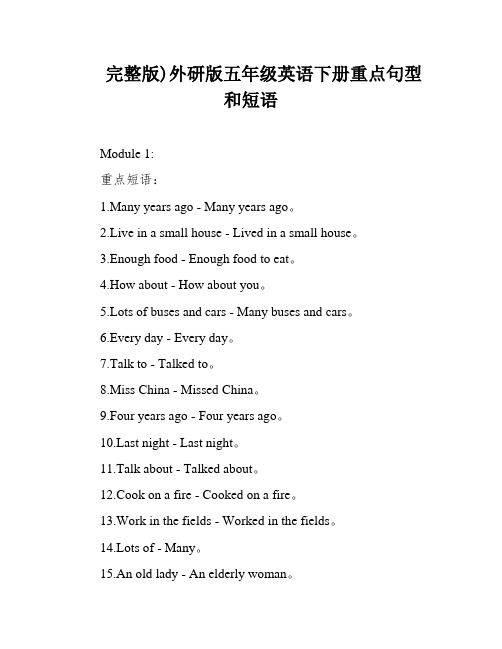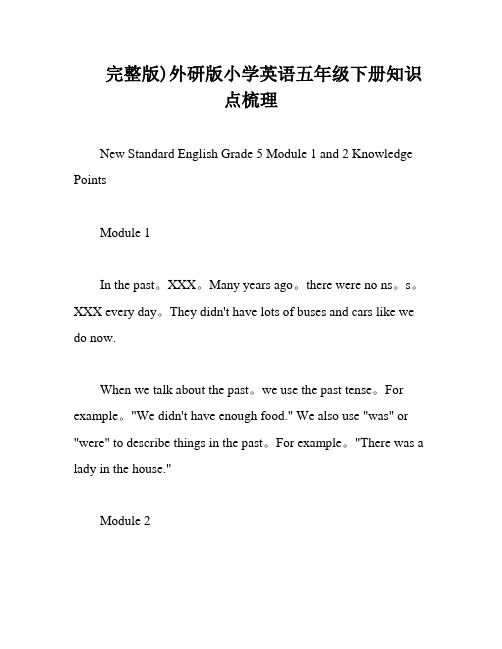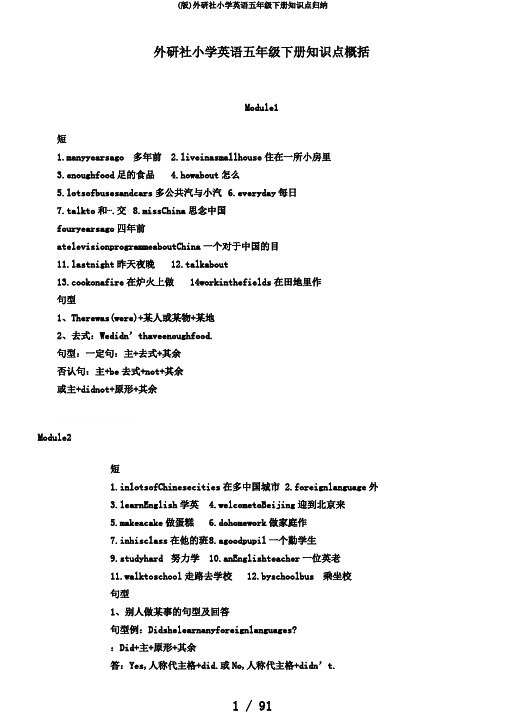(完整版)外研版英语五年级下册1·6知识点归纳
外研版五年级下册英语知识点归纳

外研版五年级下册英语知识点归纳With the conclusion of another semester, it's important to review and consolidate the knowledge learned. This article aims to provide a comprehensive overview of the key language points covered in the lower grades of the Foreign Languages Research Edition textbooks, focusing on thefifth-grade second semester.**Vocabulary**The vocabulary introduced in this semester covers a wide range of topics, including school life, hobbies, festivals, and nature. Some key words and phrases to look out for include:* School subjects: math, English, science, P.E., music, etc. * Hobbies: reading, swimming, painting, playing the piano, etc. * Festivals: Spring Festival, Mid-Autumn Festival, Children's Day, etc. * Nature: flowers, trees, rivers, mountains, seasons, etc.It's essential to familiarize yourself with these words and phrases, as they form the foundation of language learning.**Grammar**Grammar is a crucial aspect of English learning, and this semester introduces several key concepts. Some of the main grammar points to master include:* Present Simple Tense: Used to describe habitual actions or states of being. Examples: I go to school every day. She likes reading books. * There Be Structure: Used to describe the existence of something. Examples: There is a book on the table. There are many trees in the park. * Can and Can't: Used to express ability or inability. Examples: I can swim. She can't play the piano.By understanding and practicing these grammar points, students can begin to construct more complex sentences and communicate more effectively.**Listening and Speaking**Listening and speaking skills are essential for effective communication. This semester focuses on developing these skills through various activities and exercises. Students are encouraged to listen actively, understand the context, and respond appropriately. They arealso taught to speak confidently, using the language they have learned to express their thoughts and ideas.Practicing with classmates and teachers in class, as well as at home with family members, can help improve these skills.**Reading and Writing**Reading and writing are integral to language learning, and this semester sees an increase in the difficulty of reading materials and writing tasks. Students are introduced to a wider range of texts, including stories, poems, and informational texts. They are taught to understand the main ideas, extract key information, and make inferences.Writing tasks become more challenging, focusing on narrative writing, letter writing, and other forms. Students are encouraged to use their imagination, express their creativity, and practice their writing skills through regular practice.**Cultural Awareness**Language learning is not just about grammar and vocabulary; it's also about understanding the culture behind the language. This semester, students are introduced to different cultures and customs from around the world, helping them develop a more global perspective.By learning about different cultures, students can better understand and appreciate the diversity of the world and use English more appropriately in different contexts. In conclusion, the fifth-grade second semester of the Foreign Languages Research Edition textbooks covers a wide range of language points, focusing on vocabulary, grammar, listening and speaking, reading and writing, and cultural awareness. By mastering these skills and concepts, students can lay a solid foundation for further language learning and communication.**五年级下册英语知识点归纳**随着又一学期的结束,回顾和巩固所学知识显得尤为重要。
(完整word版)【原创】外研社五年级英语下册知识点梳理(可编辑修改word版)

8、I hope you are well.短语:Module 1语法:一般过去时1、a programme about China 一个关于中国的节目2、many years ago 许多年前3、enough 足够多的后面跟可数名词复数或不可数名词4、some“一些”,接可数名词复数或不可数名词,用在肯定句中any“一些”,接可数名词复数或不可数名词,用在否定句中I have apples.I don’t have apples.Do you have apples?5、lots of=a lot of 许多后面跟可数名词复数或不可数名词6、every day 每天7、Thank you for doing 感谢你做了某事8、and 和or 都表示“和”and 用在肯定句中短语:Module 2or 用在否定句和问句中9、talk about sb/sth 谈论某人/某物10、grandchild(复数)grandchildren 句子:1、We lived in a small house.2、There weren’t many buses.**There be 的过去时:There was+a/an+可数名词单数+地点。
There was+a/an+不可数名词+地点。
There were+可数名词复数(s)+地点。
3、We live in a big house.4、There are lots of buses and cars.5、He can jump really far.6、She couldn’t read or write.7、Thank you for talking to us.Thank you for doing 感谢你做了某事could 是can 的过去式,表示“过去能够”,“过去会”,后面跟动词原形。
肯定句:Sb+could+动词原形。
否定句:Sb+couldn’t+动词原形。
完整版)外研版五年级英语下册重点句型和短语

完整版)外研版五年级英语下册重点句型和短语Module 1:重点短语:1.Many years ago - Many years ago。
2.Live in a small house - Lived in a small house。
3.Enough food - Enough food to eat。
4.How about - How about you。
5.Lots of buses and cars - Many buses and cars。
6.Every day - Every day。
7.Talk to - Talked to。
8.Miss China - Missed China。
9.Four years ago - Four years ago。
st night - Last night。
11.Talk about - Talked about。
12.Cook on a fire - Cooked on a fire。
13.Work in the fields - Worked in the fields。
14.Lots of - Many。
15.An old lady - An elderly woman。
16.A programme about China - A program about China.重点句型:1.There was(were)+某人或某物+某地 - There was(were)+ XXX(即there be句型的过去式)如:There XXX’t any buses。
There were no buses。
(any意为“一些”用于否定句)2.XXX food。
- We didn't have enough food to eat.这里的didn’t为助动词,后接动词原形)3.Thank you for talking to us。
- Thank you for talking with us.for是介词,后接动词的ing形式。
完整版)外研版小学英语五年级下册知识点梳理

完整版)外研版小学英语五年级下册知识点梳理New Standard English Grade 5 Module 1 and 2 Knowledge PointsModule 1In the past。
XXX。
Many years ago。
there were no ns。
s。
XXX every day。
They didn't have lots of buses and cars like we do now.When we talk about the past。
we use the past tense。
For example。
"We didn't have enough food." We also use "was" or "were" to describe things in the past。
For example。
"There was a lady in the house."Module 2Learning a language is important。
We have to learn new words and grammar rules。
We learn by listening。
speaking。
reading。
and writing。
We also need to practice every day.Last night。
XXX me a lot about how to talk to people and ask good ns。
It was very interesting.If we want to change something。
we need to work hard and have hope。
We can't give up easily。
We need to keep trying and learning。
(版)外研社小学英语五年级下册知识点归纳

外研社小学英语五年级下册知识点概括Module1短1.manyyearsago 多年前2.liveinasmallhouse住在一所小房里3.enoughfood足的食品4.howabout怎么5.lotsofbusesandcars多公共汽与小汽6.everyday每日7.talkto和⋯.交8.missChina思念中国fouryearsago四年前atelevisionprogrammeaboutChina一个对于中国的目stnight昨天夜晚12.talkabout13.cookonafire在炉火上做14workinthefields在田地里作句型1、Therewas(were)+某人或某物+某地2、去式:Wedidn’thaveenoughfood.句型:一定句:主+去式+其余否认句:主+be去式+not+其余或主+didnot+原形+其余Module2短1.inlotsofChinesecities在多中国城市2.foreignlanguage外3.learnEnglish学英4.welcometoBeijing迎到北京来5.makeacake做蛋糕6.dohomework做家庭作7.inhisclass在他的班8.agoodpupil一个勤学生9.studyhard 努力学10.anEnglishteacher一位英老11.walktoschool走路去学校12.byschoolbus 乘坐校句型1、别人做某事的句型及回答句型例:Didshelearnanyforeignlanguages?:Did+主+原形+其余答:Yes,人称代主格+did.或No,人称代主格+didn’t.2、描绘别人做某案例:ShelearntEnglish.主 +去式+其余3、描绘他在在做某案例:HeislearningEnglishnow.主+be+ ing+其余1Module3短got有e-mailfromLinglin一封来自玲玲的子件Englishfood对于英国食品anEnglishbreakfast吃了一英式早饭⋯forlunch吃⋯作午饭traditionalEnglishdinner一的英式晚饭different特别不一样⋯to⋯把⋯school在学校ChinesefoodforLlingling玲玲做中式食品goingto打算astory故事句型1、描绘吃某些食品:主+had+食品名称+其余2、别人打算吃/喝什么:Whatareyougoingtoeat/drink?3、别人三餐吃了什么:What+did+主+have+forbreakfast/lunch/dinner?Module4短1.wantto想要2.makeane-cardforMum制作一子卡片3.begoodat擅4.gotothelibrary去findabookaboute-cards找到一本对于子卡片的atthelibrary在7.thebookaboutcomputers对于的8.onShelfC在C架上9.librarycard借卡10.bringback回来11.intwoweeks’time在两周内eourcomputer使用我的13.beeasywith用⋯很14.findout找到、找出15.inthisdictionary在本典里16.onthisCD-ROM在光上17.inthisnewspaper在上18.atthezoo 在物园19.onTV 在上句型某物在何及回答的句型:1、Wherearethe,about⋯,,please?2、Wherecanyoufindoutabout⋯?3、Youcanfindout..in/on..2Module5短1.takeittoChina它到中国2.buyyouanewone你一个新的3.thisblackbag个黑包4.twopockets两个口袋5.bigandlight又大又6.beeasyforyou你来很简单7.atthedepartmentstore在百商铺8.apandaonit有一个熊猫在上边9.betoo⋯for⋯来太⋯10.take⋯to⋯把⋯到⋯句型1、描绘事物特点的句型:It’sget⋯(big反small,heavy反light,easy反hard)2、表达见解:It’s+形容+for+人称代格Module6短1.ofcourse自然2.photosofChina中国的照片3.inthewestofChina在中国的西部4.gothere去那边styear昨年withyourmotherandfather和你的、爸爸一同去7.staywith和⋯呆在一同8.inJuly在七月9.livethere住在那边10.everyyear每年11.Lipeople黎族人12.visitherfriend拜她的朋友13.rideahorseclimbtheTianshanMountain爬天山visittheTianchiLake参天池havealovelytime度一段快乐的光alotof/lotsof多句型1、人称代和物主代的区和用法;2、用方向表达地址:It’sinthenorth/south/east/westof⋯.3Module7短1.sendanemail送子件2.acomputermessage 信息3.from⋯to⋯从⋯..到⋯..4.agoodidea一个好想法5.anidea一个想法6.clickon点7.writeyourmessage写你的信息8.atwork在工作anemailfromlittleTom一封来自小Tom的子件makeaposter制作海11.thankyoufor⋯⋯⋯而感12.workhard努力工作13.attheoffice在公室14.bebusy繁忙的15.behome在家16.atseveno’clock在七点17.onthetrain在火上18.standup起立19.runtotheblackboard跑向黑板20.ontheblackboard在黑板上句型句型1、another和theother:another用于三者以上的“此中一个”,theother用于二者之2、英的表达:①10:00teno’clock②1:58onefifty-eight③7:10tenpastseven④9:48twelvetoten⑤4:45aquartertofive⑥9:30halfpastnin eModule8(短( equickly快来 2.onthephone在通中( 3.beexcited激的4.inthesummer在个夏季(takeapresentformycousin我的堂弟一份礼品(aChinesedragonkite一此中国的筝(thesameas与⋯..同样(Ithinkso./Idon’tthinkso.我./我不(gotoaparty去参加聚会(wearabeautifuldress衣着美丽的衣服句型(句型(1、表示建的几种方法:(1)Whatabout⋯.?⋯⋯怎么?(2)Whydon’tyou⋯?你什么不⋯⋯呢?3)Howabout⋯?⋯⋯怎么?2、形容比的组成:4Module9短1.inEnglish用英stweek上周gotoachildren’stheatre去小孩院wearwomen’sclothes穿女人的衣服wearmen’sclothes穿男人的衣服telljokes/tellajoke笑laughalot大笑,笑个不断aftertheshow表演以后gotoarestaurant去餐bereadyfor⋯..⋯做好了准yourtriptoAmerica你去美国的旅游lastnight昨天夜晚inthreeweeks/inthreeweeks’time在3个周的内buy⋯for⋯⋯⋯⋯⋯abookaboutChinesehistory一本对于中国史的askyousomequestions你一些borrowabikeforyou你借一自行CDsofChinesesongs中国歌曲的光listento听intheevenings在夜晚Seeyousoon.再句型描绘某人去、在、未来做某事:1、主+去式+其余2、主+be+ ing+其余3、主+begoingto+其余Module9短feelnervous感觉makealistofthingstodo列一个要做的事情的清3.gototheairport去机4.thisweekend个周末5.gothere去那边6.attheairport在机7.inayellowtaxi乘一黄色的出租8.tallbuildings高楼speakEnglish/Chinese英/makeChinesefoodforme我制作中国的食品句型“will+原形”表示未来的作或状,组成一般未来。
外研社小学英语五年级下册知识点归纳

外研社小学英语五年级下册知识纳Module 11. many year 昨多0年前2. live in a small 住在一所小房里3. en ough f 足够的食品how ab 怎么样 5. lots of buses an 许多公共汽车与小汽车6. every day 天7. talk t 和 ?.交谈miss Chi 想念中国9. four years 四年前10. a televisi on programme ab 一个t 关 hn 中 国的电视节11. last nigh 天 晚上 13. cook on a 在炉火上做饭4 work in the fie 在田1、 T here was(weie)+或某物 +某地2、 过去式: We didrhave eno ugh food . 句型:肯定句:主语+ 动词过去式+其他 否定句:主语+b 动词过去式+n o 其他或主语+did no 动词原其他Module 21. in lots of Chin ese 在许多s 中国城市 foreig n Ian g 外gjB句型1、询问他人做过某事的句型及回Did she lear n any foreig n Ian guages?问:Did 主语+ 动词麒他 答:Yes 人称代词主格did 或No 人称代词主格didn.12. talk about地里劳作3. learn En gl 学习英语 7. in his cla 在他的班级9. study ha 努力学习11. walk to sch 走o 路 去学校4. welcome to BeSjjjfg 到 北京来6. do homework^ 庭作业 8. a good pupi 个 好学生 10. an En glish te 一位英 语老句型例:2、描述他人做过某事例:She learnt Eng主语+动词过去式+其他3 描述他们现在在做某事例:He is learn ing En glish now .主语+be动词ing其他1. have g 拥有2. an e-mail from L 一封来自玲玲的电子由件3. about En glish 关00d 英国食物4. have an En glish 匕吃了一顿英式早餐5. havefor lune 吃?作为午餐6. a traditio nal En glish 一顿传e 统的英式晚餐9. at seho 在学 校10. eook Chi nese food for 为玲玲做中式食物11. be goi ng 打算12.tell a sto 讲故事1、 描述吃过某些食物:主语+ had 食物名称+其他2、 询问他人打算吃 /喝什么: What are you goi ng to eat/dri nk3询问他人三餐吃了什么:What + did 主+have + for breakfast / lunch / dinner ? Module 41. want 想要2. make an e-eard f 为妈妈制作一张电子卡片3. be good 擅长go to the libr 去图馆5. find a book about 找到一本关于电子卡片的书6. at the libr 在图馆the book about con 关于电s 的书8. on Shelf 在> C 架上9. library cs (借书卡 10. bring b 带回来 11. in two wetikse 在两周时「内12. use our com 使用te 我 们的电脑3. be easy Wft?14. find o 找到、找出19. on TV 在电上句型 询问某物在何处及回答的句型:2 Where can you find out a ?out7.very differdln 常不同8.give to ,把 很简15. in this dictio n ary 本词典里17. i n this n ewspS 这张 报上16. on this CD-R 在这张谧 1、 Where ate,ctbo?t ,,please3 You can find out .. in / on ..短语1. take it to Cl带n它到中国2. buy you a neW给你买一个新的3. this black这个黑包two pock两个口袋5. big and li又大又轻be easy for对你来说很容易7. at the departme 在Store商店a panda o有一个熊猫在上面9. be too for 对?来说太10. take to? 把?带到?句型 '1、描述事物特征的句型:It'get ( big反jSmajl heav反义h,eas反义rd2、表达看法:lt'+形容词+ for人称代词宾格Module 6短语1、人称代词和物主代词的区别和用法;2 用方位词表达地点:It'in the north / south / east / west o,1. of courSe然3. in the west of Chi 中国的西2. photos of c 中na 的照片4. go the去那儿5. last ye i r年6. g o with your mother and 你a的妈妈、爸爸起去8. in Jul在七9. live the住在那儿10. every y每年11. Li peo黎e族人12. visit her frien访她的朋友3 ride a hoBe14. climb the Tian sha n 爬天山ain15. visit the Tia nch 参观k天池16. have a lovely度|过厂段愉快的时光Module 719. run to the blac 跑向黑板20. on the blackbfe 黑板上 句型1、an 。
外研版(三起)-英语-五年级下册--Module 1 重点细归纳
外研版(三起)-英语-打印版重点细归纳Ⅰ、单词still /stil/(副词)仍然lady/’leidi/(名词)女士;夫人life/laif/(名词)生活ago/a’gəu/以前enough/i’nʌf/(形容词)足够的change/tʃeindʒ/c动词)改变night/nait/(名词)夜晚fire/faiə/(名词)火radio/’reidiəu/(名词)收音机write/rait/(动词)写hope/həup/(动词)希望Ⅱ、词组l.be different不同的 2.lots of许多 3.watch TV看电视4.talk to与某人交谈5.talk about讨论关于某事st night昨晚Ⅲ、语法l.There weren't any televisions.(过去)没有电视。
there be表示某处有某物,表示一种“处所有”,而have/has表人有什么,有时也用拟人化的句子中,例如:It has four legs.它有四条腿。
2.We didn’t have enough food.我们没有足够的食物吃。
这是一个一般过去时态的句子,谓语动词是have,这时我们添加didn't构成否定句,enough在这里是形容词,修饰food.3.Thank you for talking to us.与你交谈深感荣幸。
用来交谈之后的客套话,其中thank for表示感谢的原因,后面接动词要跟v-ing.英语欢乐园The Doctor's Advice“Doctor, this tooth of mine is keeping me awake for nights! Can you advise me?’’‘‘Yes! Get yourself' a job as a night watchman."“医生,我的这颗牙让我好几个晚上睡不着觉!你能给我提些建议吗?”“好的,给你自己找一份守夜的工作吧。
外研社小学英语五年级下册知识点归纳
写作技巧:分段 和组织文章,突 出主题和重点信 息
范文:一篇关于 外研社小学英语 五年级下册课文 的读后感
范文:一篇关于 外研社小学英语 五年级下册课文 的摘要和总结
阅读和写作练习题
阅读理解:根据短文内 容,回答问题
写作练习:写一篇关于 自己最喜爱的季节的短
文
词汇运用:根据上下文, 填入适当的单词
学习外语的同时, 也要了解外国的文 化背景和习惯,以 便更好地理解和运 用语言。
跨文化交流有助于增 进国际友谊和合作, 促进世界和平与发展。
文化背景和跨文化交流练习题
题目:请简述外研社小学英语五年级下册中提到的中外文化差异。
题目:列举外研社小学英语五年级下册中涉及的跨文化交流场 景,并分析其对语言学习的意义。 题目:阅读以下对话,分析其中体现的跨文化交流问题,并提出 改进建议。 题目:请根据外研社小学英语五年级下册的知识点,设计一份 跨文化交流的实践活动方案。
• A: Do you like apples? • B: Yes, I do. • A: What about bananas? • B: No, I don't like bananas. • 问题:Does B like bananas? • 答案:No, B doesn't like bananas.
场景模拟:模 拟真实生活场 景,让学生在 实际应用中掌 握英语口语表 达。
角色扮演:学 生可以扮演不 同角色,进行 对话练习,增 强口语表达的 生动性和趣味 性。
口语和日常用语练习题
• 请根据以下对话,回答问题: A: What's your name? B: My name is John. A: How old are you? B: I'm 10 years old. 问题:What is B's name? 答案:B's name is John.
(精校版)【原创】外研社五年级英语下册知识点梳理
(直打版)【原创】外研社五年级英语下册知识点梳理(word版可编辑修改)编辑整理:尊敬的读者朋友们:这里是精品文档编辑中心,本文档内容是由我和我的同事精心编辑整理后发布的,发布之前我们对文中内容进行仔细校对,但是难免会有疏漏的地方,但是任然希望((直打版)【原创】外研社五年级英语下册知识点梳理(word版可编辑修改))的内容能够给您的工作和学习带来便利。
同时也真诚的希望收到您的建议和反馈,这将是我们进步的源泉,前进的动力。
本文可编辑可修改,如果觉得对您有帮助请收藏以便随时查阅,最后祝您生活愉快业绩进步,以下为(直打版)【原创】外研社五年级英语下册知识点梳理(word版可编辑修改)的全部内容。
某物7、like sb/sth very much非常喜欢某人/某物8、不规则动词过去式:give——gaveeat-—ate buy—-bought have--had write-—wrote句子:1、—-What did she have for breakfast?她吃什么作为早餐?-—She had eggs and sausages。
2、--What did you have for dinner?--I had fish and chips.3、Lingling had a sandwich because she doesn’t like hamburgers。
(对“because+句子”提问,要用疑问词why)4、He likes hamburgers very much.5、Mum is going to cook Chinese food for us。
Sb be(am/is/are)going to do。
某人打算做某事.6、不规则动词过去式:have——had eat—-ateModule 4短语:1、send sb sth =send sth to sb送某物给某人2、the books about science 有关科学的书(about关于)3、ask sb to do 叫某人做某事4、in the wrong place在错误的地方5、make a home library搞一个家庭图书馆6、as well也放句末too也放句末also也放句中7、不规则动词过去式:send--sent句子:1、—-Let’s make a home library.—-That's a good idea。
- 1、下载文档前请自行甄别文档内容的完整性,平台不提供额外的编辑、内容补充、找答案等附加服务。
- 2、"仅部分预览"的文档,不可在线预览部分如存在完整性等问题,可反馈申请退款(可完整预览的文档不适用该条件!)。
- 3、如文档侵犯您的权益,请联系客服反馈,我们会尽快为您处理(人工客服工作时间:9:00-18:30)。
英语五年级下册期中知识点归纳Module1短语和句子1.then 当时,那时2. now 现在3. talk about 谈论4. I miss China我想念中国5.We live in a small house我们住在一所小房里6.Thank you for talking to us.谢谢你告诉我们这些7.how about now?现在怎么样?8.There are lots of buses and cars有许多公共汽车与小汽车9. It’s a programme about China 一个关于中国的电视节目10.There is only one cat now现在只有一只猫现在11.She couldn’t read or write.她既不能读也不能写12.cook on a fire在炉火上饭13.work in the fields在田地里劳作Module2短语和句子1.She learnt English她学过英语2.make a cake做蛋糕3.do homework做家庭作业4.in his class在他的班级5.a good pupil一个好学生6.study hard努力学习7.studied hard以前努力学习8. walk to school走路去学校9.an English teacher一位英语老师9.with sb和某人10.by school bus乘坐校车11.She danced in lots of Chinese cities 她在中国的许多城市跳过舞12.Did she learn any foreign languages?她有学过任何外语吗?13.He likes working at school.她喜欢在学校工作Module3短语和句子1.I have got an e-mail from Lingling我收到一封来自玲玲的邮件2.about English food关于英国食物3.have an English breakfast吃了一顿英式早餐4.What did you have for breakfast/lunch/dinner?你早餐/午餐/晚餐吃什么?5.What did Lingling have for breakfast/lunch/dinner?玲玲早餐/午餐/晚餐吃什么?6.What did she have for breakfast/lunch/dinner?她早餐/午餐/晚餐吃什么?7.It’s a traditional English dish这是一道传统的英式佳肴8.She gave her hamburges to Sam玲玲把她的汉堡包回来萨姆9.Tonight Mum is going to cook Chinese food for us今晚妈妈打算为我们做中式食物Module4短语1.want to想要2. be good at 擅长3.be good at擅长4.go to the library去图书馆5. We have got books for teachers.我们有为老师准备的书6.Let’s make a home library.让我们一起建一个家庭图书馆吧7.That’s a good idear.这是个好主意8.Where are the books about sports?关于运动类的书在哪里?9.on Shelf C在C架上10.This is a guide for us to get information from the school library.这本手册可以为我们从图书馆找到信息。
11.We can find information from books我们可以在书里获取信息12.There are lots of different ways to find information on this topic.有很多的方法可以获取关于这个话题的信息。
Module5短语1.You can’t take it to China你不能带它到中国2.I’ll buy you a new one我将会给你买一个新的3.this black bag这个黑包4.It’s two pockets它有两个口袋5.It has two pockets 它有两个口袋6.It has four wheels 它有四个轮子7.It’s big and light它又大又轻8.It’ll be easy for you to carry它将对你来说很容易搬运9.at the department store在百货商店10.We’ll take it我们将会买下它11.a panda on it有一个熊猫在上面12.It’s too big for you这对你来说太大了13.ride a bike起自行车14.ride a horse骑马Module6短语1.of course当然2. last year 去年3. a lot of /lots of许多4. in July 在七月5.They are photos of me他们是我的照片6.It’s in the west of China它在中国的西部7.I go with my mother and father我和我的父母一起去的8.I stay with my grandma for a week.我和我外祖父待了一周9.climb the Tianshan Mountain爬天山10.visit the Tianchi Lake参观天池11.have a lovely time度过一段愉快的时光12.a lot of/lots of许多13.an English、an egg、an email、an old lady、an orange、an apple、an e-book、an umbrella)一.动词的过去式:(左边为动词过去式,右边为动词原形)回来come ---came 掉落drop ---dropped 去go ---went遇见meet ---met 买buy ---bought 跑run ---ran做do/does ---did 有,吃have/has---had 是is/am ---was是are---were 看见see---saw 带,拿take---took参观,拜visit---visited 吃eat --- ate 找到,发现find ---found 丢失lose----lost 洗wash ---washed 看watch ---watched 告诉tell---told 跑run--ran 游泳swim—swam赢win---won 丢失lose---lost 穿wear---wore骑ride---rode 教teach---taught 学习learn---learnt写write---wrote 学习study---studied 发送,寄send---sent可以can---could 玩play---played停留stay---stayed 爬climb---climbed 注意:当在一个句子里看到:last(上一个),ago(以前),yesterday(昨天),then(当时)这些单词时动词用过去式二.哪些情况下动词用原形?当我们看到单词:can, can’t, could, couldn’t, did, didn’t, do, don’t, does, doesn’t, let, will, be going to,(be动词有三个分别是:am is are )to, 时,动词要用原形。
遇到哪些情况动词要加ing?1.Be动词(am is are)+动词ing 如:He is learning English.2.短语:like doing sth喜欢做某事如:He likes working at school.3.介词for+动词ing 如:Thank you for talking to us三.一些介词,数量词等的用法How many 和how much 的区别how much多少-用于不可数名词(名词后面没有s)how many多少-用于可数名词复数(名词后面加s)much多少-用于不可数名词(名词后面没有s)many多少-用于可数名词复数(名词后面加s)or和and的区别or 用于否定句and 用于肯定句any和some的区别any用于疑问句和否定句some用于肯定句is(was)和are(were)的区别is(was)用于单数(一个用单数)are(were)用于复数(两个或两个以上用复数)单数和复数,名词的变化单数时:名词后面不加S复数时:名词后面加S或es 名词变复数时的规则如下:1.一般情况直接加s2.以o、x、sh、ch 结尾的单词加es O分两种情况:①有生命的加es(tomato西红柿)②无生命加s(photo照片)PS: 动词是帮助构成各种时态。
如:一般将来时,一般现在时,一般过去时和一般进行时。
名词只是在单数和复数的情况下需要加s或es四种时态的基本特征:一般现在时:定义:1表达经常性或习惯性的动作。
2表示现在的状态。
3叙述客观事实真理(如地球围绕太阳跑)表示经常发生的动作或目前的状况。
第三人称单数做主语,动词词尾使用“规则如下:1)直接加s、es如:likes、plays、reads2)以o、s、x、sh、ch结尾,加es如:watches、washes、goes、guesses3)“辅音字母+y结尾”,变y为i加es如:study-studies 、carry-carries现在进行时:定义:表示现在、说话瞬间正在进行或发生的动作。
动词词尾使用如下:1.一般情况下,直接加ing,如:cook-cooking2.以不发音的e结尾,去e加ing,如:make-making, taste-tasting3.重读闭音节且只有一个辅音字母结尾的,应双写末尾的辅音字母,再加ing,如:run-running, stop-stopping一般过去时定义:表示过去某个时间发生的动作或存在的状态。
动词词尾使用规则如下:①一般情况,直接加上-ed。
如:look-looked。
②以不发音的字母e结尾的动词,加-d。
如:live-lived。
③以重读闭音节结尾,先双写辅音字母,再加-ed。
如:stop-stopped④辅音字母+y结尾的动词,先变y为i,再加-ed。
如:study-studied。
